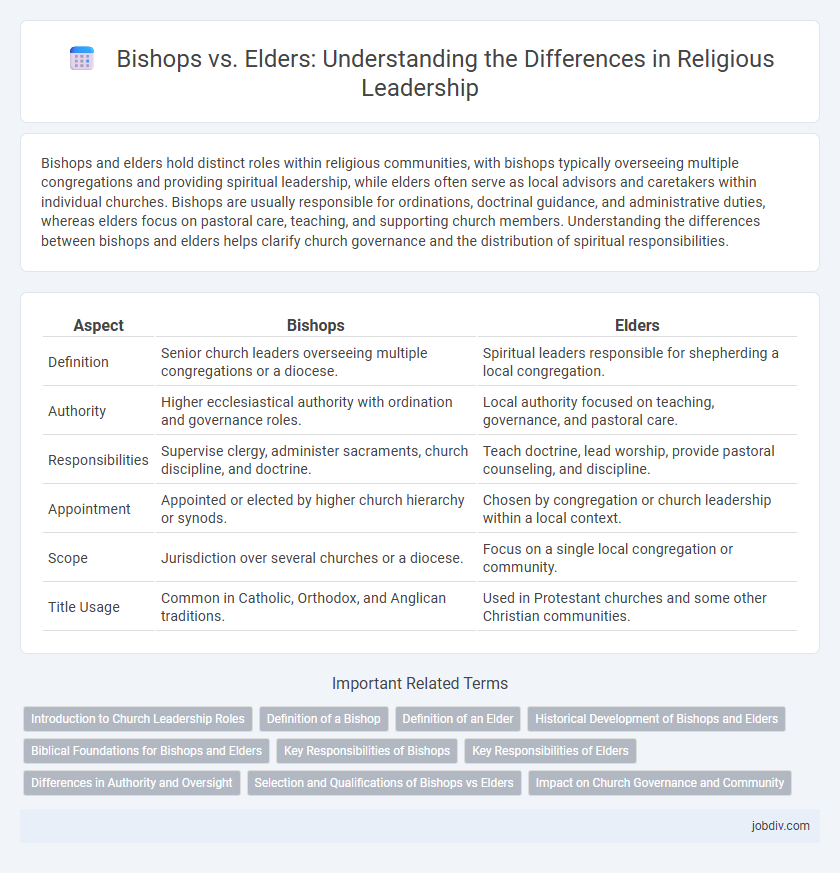Bishops and elders hold distinct roles within religious communities, with bishops typically overseeing multiple congregations and providing spiritual leadership, while elders often serve as local advisors and caretakers within individual churches. Bishops are usually responsible for ordinations, doctrinal guidance, and administrative duties, whereas elders focus on pastoral care, teaching, and supporting church members. Understanding the differences between bishops and elders helps clarify church governance and the distribution of spiritual responsibilities.
Table of Comparison
| Aspect | Bishops | Elders |
|---|---|---|
| Definition | Senior church leaders overseeing multiple congregations or a diocese. | Spiritual leaders responsible for shepherding a local congregation. |
| Authority | Higher ecclesiastical authority with ordination and governance roles. | Local authority focused on teaching, governance, and pastoral care. |
| Responsibilities | Supervise clergy, administer sacraments, church discipline, and doctrine. | Teach doctrine, lead worship, provide pastoral counseling, and discipline. |
| Appointment | Appointed or elected by higher church hierarchy or synods. | Chosen by congregation or church leadership within a local context. |
| Scope | Jurisdiction over several churches or a diocese. | Focus on a single local congregation or community. |
| Title Usage | Common in Catholic, Orthodox, and Anglican traditions. | Used in Protestant churches and some other Christian communities. |
Introduction to Church Leadership Roles
Bishops and elders hold distinct but complementary leadership roles within Christian churches, each responsible for spiritual oversight and governance. Bishops typically possess broader authority over multiple congregations, tasked with ordination, doctrinal supervision, and pastoral care on a regional or denominational level. Elders generally serve at the local church level, focusing on congregational leadership, teaching, and maintaining church discipline.
Definition of a Bishop
A bishop is a high-ranking Christian cleric who holds spiritual and administrative authority over a diocese or a group of congregations, responsible for teaching doctrine, overseeing church discipline, and ordaining ministers. Unlike elders, who may serve smaller local roles, bishops have broader jurisdiction and often function as regional overseers within hierarchical church structures such as Catholic, Orthodox, and Anglican traditions. The role of a bishop is explicitly defined in scriptures like 1 Timothy 3:1-7, emphasizing qualities of leadership, integrity, and the ability to manage church affairs effectively.
Definition of an Elder
An elder is a mature spiritual leader within a Christian congregation, responsible for teaching, shepherding, and overseeing the community's spiritual welfare. Unlike bishops, elders often serve in a collective leadership model, emphasizing guidance and pastoral care rather than hierarchical authority. Their role is defined by scriptural mandates that highlight character qualifications and the ability to manage church affairs effectively.
Historical Development of Bishops and Elders
The historical development of bishops and elders reveals distinct roles evolving from early Christian communities, where elders initially oversaw local congregations with pastoral and teaching responsibilities. Over time, bishops emerged as higher-ranking officials tasked with supervising multiple congregations and maintaining doctrinal unity, particularly by the second century. This hierarchical differentiation solidified through Church councils and ecclesiastical writings, shaping the governance structures evident in contemporary denominations.
Biblical Foundations for Bishops and Elders
Biblical foundations for bishops and elders stem from key New Testament scriptures such as 1 Timothy 3:1-7 and Titus 1:5-9, which establish qualifications for church leadership emphasizing character, teaching ability, and governance. The terms "bishop" (episkopos) and "elder" (presbyteros) often overlap, with elders serving as spiritual overseers and bishops fulfilling supervisory roles within the early church's hierarchical structure. Scriptural texts like Acts 20:17-28 illustrate apostles appointing elders to shepherd congregations, indicating functional equivalence while highlighting the distinct administrative responsibilities associated with bishops.
Key Responsibilities of Bishops
Bishops primarily oversee the spiritual and administrative leadership of a diocese, guiding clergy and laity in matters of faith and doctrine. They are responsible for ordaining priests, confirming church members, and ensuring adherence to church laws and traditions. Their role extends to pastoral care, safeguarding church teachings, and representing the church in external relations.
Key Responsibilities of Elders
Elders primarily oversee the spiritual growth, teaching, and pastoral care within the congregation, ensuring doctrinal integrity and moral guidance. They are responsible for shepherding the church members, providing counseling, and facilitating fellowship among believers. Unlike bishops who may have broader administrative duties, elders focus on nurturing the faith community through prayer, scripture teaching, and maintaining unity.
Differences in Authority and Oversight
Bishops possess a higher level of authority and broader oversight responsibilities compared to elders, including governance over multiple congregations or dioceses, whereas elders typically oversee local church leadership and spiritual guidance within a single congregation. Bishops have the power to ordain clergy, administer sacraments, and enforce church discipline on a wider scale, while elders focus on pastoral care, teaching, and maintaining doctrinal purity at the local level. The hierarchical structure places bishops in a supervisory role with jurisdictional authority, contrasting with the more collaborative and supportive role of elders.
Selection and Qualifications of Bishops vs Elders
Bishops are typically selected based on rigorous criteria including proven pastoral leadership, doctrinal soundness, and a reputation for moral integrity, as outlined in scriptures like 1 Timothy 3:1-7 and Titus 1:6-9. Elders, while also required to meet similar qualifications such as being above reproach and able to teach, often serve in a more localized or congregational capacity with selection processes that vary by denomination. The distinction in qualifications reflects the broader scope of responsibility for bishops, who oversee multiple congregations, whereas elders focus on shepherding individual churches.
Impact on Church Governance and Community
Bishops hold significant authority in church governance, overseeing multiple congregations and making key doctrinal decisions, which centralizes leadership and maintains uniformity across the church. Elders typically serve within individual congregations, providing pastoral care and guidance, fostering a more localized and relational form of leadership. The distinction in roles influences community dynamics by balancing hierarchical oversight with grassroots involvement, shaping both administrative efficiency and congregational engagement.
bishops vs elders Infographic

 jobdiv.com
jobdiv.com